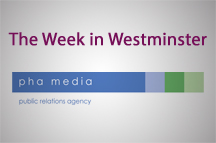 The press has been so enthralled by Brexit in the past weeks, it can be easy to pay little attention to the other, equally important, developments in Westminster. This week began as no exception, with Brexit news eating up a great deal of coverage. The ongoing strife over the Irish border – an issue which seemed largely settled, finally, before last June’s referendum cast a shadow over the Good Friday Agreement – spilled over from previous weeks, as there seemed little movement over the issue and Sinn Féin MP Chris Hazzard raised the prospect of civil disobedience against possible customs checks.
The press has been so enthralled by Brexit in the past weeks, it can be easy to pay little attention to the other, equally important, developments in Westminster. This week began as no exception, with Brexit news eating up a great deal of coverage. The ongoing strife over the Irish border – an issue which seemed largely settled, finally, before last June’s referendum cast a shadow over the Good Friday Agreement – spilled over from previous weeks, as there seemed little movement over the issue and Sinn Féin MP Chris Hazzard raised the prospect of civil disobedience against possible customs checks.
Then came reports that negotiators were close to agreeing the biggest divorce settlement in history, to the tune of about £50 billion fromthe UK’s pockets, if predictions are correct. The news of the long-anticipated ‘divorce bill’ came with a discernible inevitability; but that didn’t stop one writer for the Spectator branding the bill a ‘ransom’. There was the usual bickering this week, too, with Michel Barnier appearing to accuse Britain of abandoning its commitments to European solidarity and security. Meanwhile, Facebook and Twitter agreed to provide evidence of Russian-backed posts to the House of Commons media watchdog, in the latest development of the scandal over foreign intervention in the EU referendum.

Tearing your gaze away from Brexit is usually difficult, but there was controversy and scandal aplenty this week away from Britain’s favourite current affairs issue. Budget news rolled over from Philip Hammond’s speech last Wednesday, helped along by accusations on Monday that Tory ministers were ‘rigging Parliament’ by not tabling an ‘amendment of the law resolution’. This meant that amendments outside the scope of the Budget itself were effectively disallowed, though Hammond defended the action as a ‘small, worthwhile modernisation measure’. Catchy. These developments followed a weekend of light bruising for the Chancellor, as the Sun and Daily Mail grew near-hysterical over a ‘£1.8bn stealth tax’ targeting savers, and even writers in the Sunday Times were less than enthused by Hammond’s plans to fix the housing market.
In the meantime, Theresa May, perhaps quite shrewdly, had beaten a tactical retreat to the Middle East, away from the heat of PMQs and her duplicitous cabinet – but not far enough to escape the heat of Donald Trump’s wrathful tweeting. His latest virtual spat came after Downing Street condemned his retweeting of Islamophobic videos, originally posted by Britain First’s Jayda Fransen, who gleefully received POTUS’s patronage. Trump responded to criticism by urging May to direct her attentions to ‘the destructive Radical Islamic Terrorism’ in the UK, rather than his destructive, radical Twitter activity.
The dispute was remarkably well timed, as the Prime Minister was stopping off in Iraq and Jordan on her way to Riyadh, as part of a whistle-stop tour designed to solidify alliances and increase the UK’s influence post-Brexit. May could be all the more keen to promote a more independent foreign policy, especially as this tweet is the latest in a series of actions that suggest Trump isn’t as serious about his international commitments and alliances as might be hoped. It certainly helps clarify who the PM can and can’t rely on.
I hope you have managed to come to the surface for some air. It has been a characteristically frenzied week in Westminster, and with RBS announcing just this morning that 259 branches would close, the news agenda doesn’t look like it will be giving us a rest any time soon.














